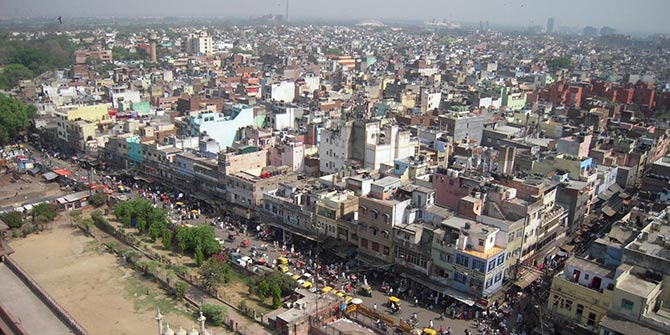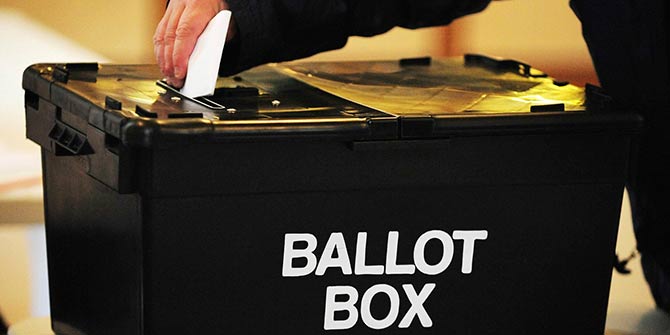LSE’s Marc Davies looks at the precariousness of democratic gains and value of leadership in Nigeria’s 2015 elections.
Sustained electoral reforms in recent years seem to have revived hopes in the management of diversity in Nigeria, former Chairman of Nigeria’s Independent National Electoral Commission (INEC) Professor Attahiru Jega said in a recent public lecture at the London School of Economics of Political Science (LSE).
Reflecting on the acclaimed successes of Nigeria’s 2015 general elections in April in which former military leader Muhammadu Buhari replaced the incumbent Goodluck Jonathan, Jega remarked that this was the first election in Nigeria’s history in which an incumbent was peacefully ousted by the ballot, conceded defeat and transferred power to the opposition.

A recent history of elections marred by violence, fraud, ethnoreligious tensions and result disputations, according to Jega, resulted in mixed expectations and prognoses ahead of the vote earlier this year. He said that many observers doubted that the relative success of the 2011 general elections would be replicated but that there was increasing confidence in the Commission’s capacity to ensure a level playing field in 2015.
“The Commission was well aware that the 2015 elections would be a major litmus test for Nigeria’s democracy and that the outcome would be significant both for Nigeria and for Africa,” he said regarding the importance of the election as a crossroads either towards democratic consolidation or a reversal of the gains made in 2011.
The successful transfer of power to the opposition as well as preservation of the electoral commission after the vote, in contrast to a series of commission disbandments in the past, is indicative – in Jega’s words – of a “break from the vicious cycle of poorly conducted elections in the past”.
Integral to the successes of the 2015 ballot, Jega explained, were a variety of reforms and innovations. At the organisational level, reforms included a review of the Independent National Electoral Commission (INEC) itself, accepting recommendations on its restructuring from academics and ‘civil society’, and developing new communication and gender policies. Upgrading databases and optimising the voters’ register, a core part of the Commission’s strategy for credible elections, eliminated approximately four million duplicate or ‘ghost’ voters off the electoral roll, according to Jega.
Innovative developments, he said, included the introduction of the Permanent Voters Card, new smart cards that containing biometric data for scanning at voting stations using electronic readers to reduce fraud or irregularities. Accommodating contextual constraints, such as the absence of electricity connections or internet connectivity in certain voting districts, Jega said, meant that methodologies had to be designed to make alternative arrangements in some areas including providing pre-charged batteries.
Perhaps most fundamental to the overall success, Jega argued, was the Commission’s prioritisation of gaining the trust and confidence of stakeholders. “There is a tendency for Commissions to think that we just manage elections, but the processes, interactions and relationships leading to the conduct of elections are very important,” he said.
It appears here that the organisation and accomplishment of a credible, free and fair election – in a country that has experienced extremely challenging elections in past – demanded more than a ‘checklist’ of efficient technical or technocratic solutions to an institutional-political-societal impasse. The legitimacy of the electoral commission, the extent to which citizens trust in its integrity and value its utility, has depended considerably on sound, strategic and creative leadership that can manage diverging interests and visions, ameliorate tensions, affirm nonpartisanship and convince a ‘skeptical’ electorate, in Jega’s words, to head to the polls in a context of extreme economic inequality and burgeoning insecurity.
Economic disparities, high levels of insecurity and other political challenges are in fact a sobering reminder – amid the remarkable success of the elections – of the precariousness of this democratic gain. Jega himself acknowledged that credible elections and a vastly strengthened electoral commission will not be a panacea vis-à-vis Nigeria’s complex socio-economic and ethno-religious landscape. Rather, this requires careful treading and commitment among numerous stakeholders, especially leaders, to democratic principles and outcomes to sustain these recent achievements in Africa’s biggest economy. Perhaps the unprecedented mass protests led by students and workers in South Africa is evidence of how even where strong democratic institutions are constitutionally guaranteed, a chasm in effective leadership to drive these institutions towards realising tangible gains for the majority can lead to disillusionment and sustained socioeconomic inequalities. In other words, free and fair elections are certainly achievements worth celebrating but are always at risk of becoming fleeting and devalued phenomena in societies that suffer deep socioeconomic cleavages and, especially in the case of Nigeria, ethno-religious tensions. Humble leadership that is committed to empowerment of citizens – tangibly and not merely symbolically, for example, through the vote itself – surely remains a requisite to ensuring the longevity of democratic institutions like elections.
The recent general elections in Nigeria do seem to indicate a marked shift in the capacity of its electoral commission towards ensuring credible and peaceful general elections over time. However, in the same way Professor Jega’s strategic and creative leadership appears to have been indispensible to this achievement, so will be sound leadership and commitment to substantive democracy in other institutions if elections are to retain utility among citizens in contexts of economic cleavages and insecurity. Building faith in elections as an instrument that empowers citizens substantively – not merely as abstract political actors – hence remains crucial to sustaining the legitimacy of elections and avoiding a reversal of gains.
Listen to Professor Attahiru Jega deliver his public lecture at LSE entitled Nigeria’s 2015 election: giving democracy a chance.
Marc Davies is a Masters student in the African Development programme at LSE. Follow him on twitter @MarcDDavies.
The views expressed in this post are those of the authors and in no way reflect those of the Africa at LSE blog or the London School of Economics and Political Science.




